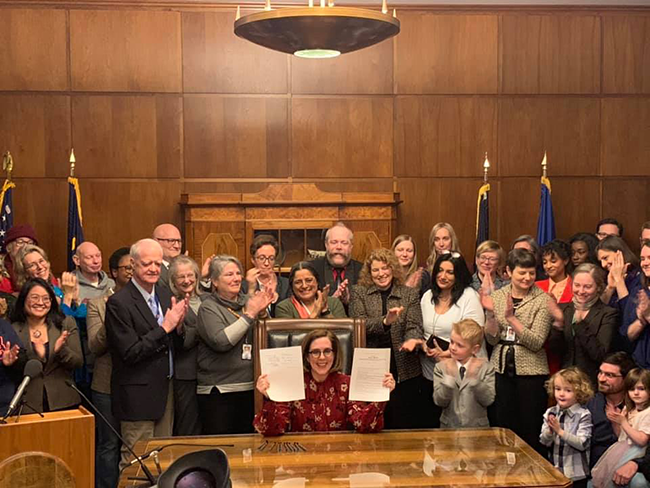From the Field: Oregon Passes Nation’s First Statewide Rent Control Law
Mar 04, 2019
Oregon is the first state to implement a statewide rent stabilization law. Governor Kate Brown (D) signed Senate Bill 608 (SB 608) on February 28, protecting Oregon renters from the frequent and large rent increases that have been prevalent in recent years. SB 608 establishes a maximum annual rent increase of 7% plus the consumer price index (CPI) measure of inflation for rental housing more than 15 years old. The new law also establishes a for-cause eviction standard for renters after 12 months of occupancy. The bill is designated as “emergency legislation,” meaning it takes effect immediately. The organizations dedicated to passing SB 608 came together as the Stable Homes for Oregon Families campaign, coordinated by several statewide organizations, including the Oregon Housing Alliance, an NLIHC state partner, and the Community Alliance of Tenants, an NLIHC member.

Governor Kate Brown signs Oregon’s historic rent regulation law
on February 28, 2019
Oregon’s new rent-regulation law is unique because it applies to the entire state, rather than just providing a framework within which municipalities can choose to participate. The state law will not apply to rent increases on vacant apartments if the prior tenant vacated by choice or by for-cause eviction. Subsidized properties are exempted from the law’s rent-regulation provisions because their rents are already established by state or federal program guidelines.
The rent-regulation guidelines are bolstered by the new limits on “no-cause evictions” – when a renter is ordered to leave a property not because of any violation of the lease, but because their fixed-term or month-to-month lease is at an end. No-cause eviction is essentially ended with this act for all month-to-month leases after their initial 12 months. Landlords can still evict renters for common lease violations such as non-payment of rent or damage to property. The bill also creates new reasons for landlord-based for-cause evictions such as: when a property owner sells the property to a new owner who intends to move in; when the landlord wants to move in themselves or move in a family member; or when there are repairs and renovations substantial enough to require a renter to vacate. When landlords use one of the new kinds of for-cause eviction, they must provide a 90-day notice and relocation expenses in the amount of one month’s rent. Landlords of small properties who own four or fewer rental units are exempt from having to pay relocation expenses. Landlords who live on the same property as their tenants and who own two rental units or fewer may use no-cause evictions at any time.
An important element to the ultimate passage of SB 608 was the multi-sector support for the campaign. Stable Homes for Oregon Families was officially endorsed by labor groups such as SEIU Locals 503 and 49, the Oregon AFL-CIO and Oregon AFSCME Council 75; women’s organizations such as Oregon National Organization for Women (NOW) and the Oregon Alliance to End Violence Against Women; racial justice organizations such as the Coalition of Communities of Color and the Latino Network; and education advocates such as the American Federation of Teachers (AFT) Oregon and the Oregon Student Association. The bill also had the official support of several major municipal and county governments, including the cities of Portland and Eugene, and Washington, Multnomah, and Clackamas counties. These allies mobilized an impressive groundswell of support for SB 608; more than 80 supporters provided eight hours of testimony before the legislature.
“We are so thrilled that people all across Oregon who rent their homes will have basic protections against no-cause evictions and extreme rent increases. For years, the use of no-cause evictions and unlimited rent increases have been wreaking havoc in our communities,” said Alison McIntosh, policy and communications director for Neighborhood Partnerships, the convener of the Oregon Housing Alliance. “This victory is several years in the making and is built on the outstanding advocacy of impacted renters who told their stories persuasively and persistently until law makers saw the best path forward was sensible state policy to produce stable, affordable communities for renters.”
For more information about SB 608, contact Alison McIntosh at [email protected]